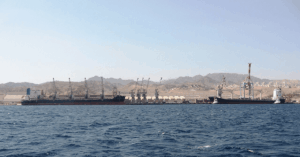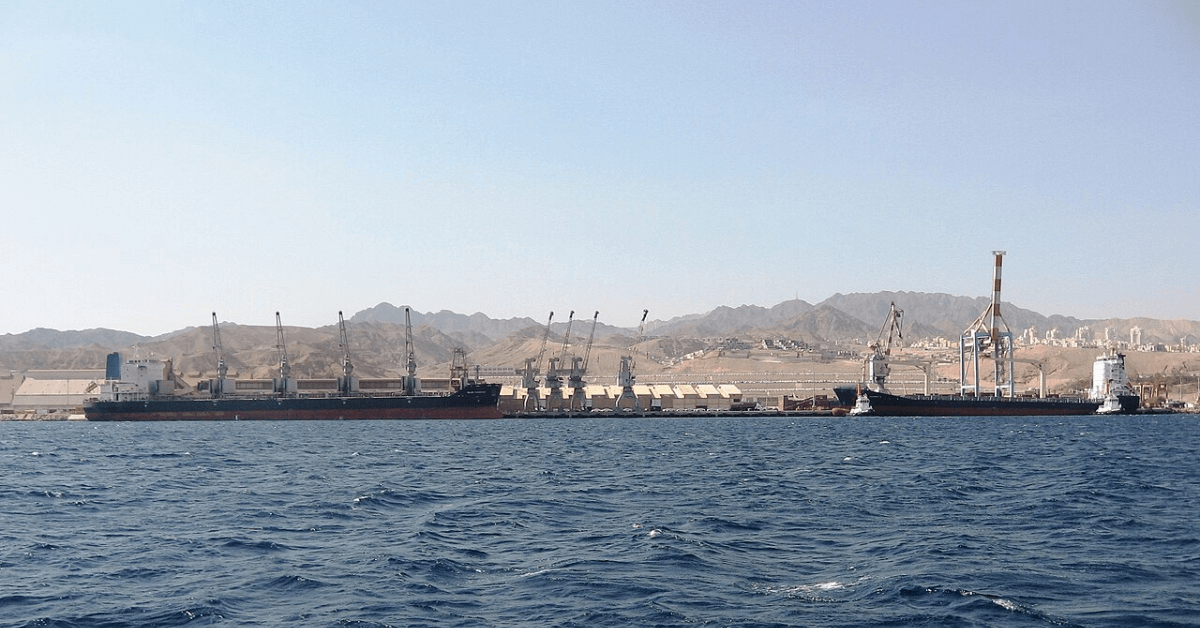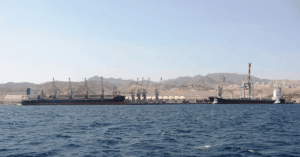
Japan’s K-Line Plans To Divert More Ships Away From U.S. Over Rising Tariffs
July 17, 2025
Navigator Gas Partners With Amon Maritime To Build Two New Ammonia Carriers
July 18, 2025

Israel’s only southern seaport, the Port of Eilat on the Red Sea, is set to stop all commercial operations from July 20. This follows a severe financial crisis caused by unpaid taxes, halted concession payments, and a collapse in revenue due to the Red Sea conflict and Houthi attacks.
According to multiple reports in Israeli media, the Eilat Municipality has seized all the port operator’s bank accounts after months of unpaid municipal taxes. These debts are estimated to be between NIS 600,000 and NIS 700,000 per month, totaling nearly 10 million shekels (about $3 million). Along with this, the operator has failed to pay over NIS 3 million ($892,000) in concession fees to the Israeli government since the start of the war.
The port has been struggling for nearly 20 months, with commercial activities largely shut down after the war in Gaza began and Yemen’s Houthi forces began targeting ships in the Red Sea. Since November 2023, Houthi missile and drone attacks have intensified, with ships linked to Israel being diverted away from the area.
The Houthis recently claimed responsibility for a dual drone strike targeting Eilat port and a military site in the Negev region, describing it as a successful operation. Israel has not officially responded to this claim.
In 2023, Eilat Port handled 134 ships and imported about 150,000 vehicles, nearly 50% of all cars entering Israel. It also supported exports of potash, fertilizers, and minerals and was part of the crude oil transport route via the Eilat-Ashkelon pipeline (EAPC). The port was developed by the Israeli government in the 1950s and has remained a smaller but strategic facility, located south of the Suez Canal.
However, by 2024, the situation had worsened. Revenue dropped by nearly 80%, from NIS 212 million ($63 million) in 2023 to just NIS 42 million ($12.5 million). Only 16 ships visited the port in 2024, and no cars were imported. In the first half of 2025, just six ships called at the port. The company laid off half of its workforce by March 2024, and income from vehicle imports fell by 100%.
The current port operator, owned by the Nakash brothers, won the 15-year concession in 2012, as the only bidder, for NIS 120 million, with an option to extend it for 10 more years. In the years before the war, the port became profitable, and the owners reportedly withdrew a dividend of NIS 162 million over four years. Industry experts at the time believed the concession price was low and offered a chance to make hundreds of millions in profit.
Now, the situation has reversed. A letter from the National Emergency Authority confirmed that the municipality had seized all of the port’s accounts due to the operator’s debts. The letter warned that if the shutdown continues, port equipment such as cranes and electrical systems could deteriorate, causing long-term damage. All tugboats and other vessels will be stopped, and the port will no longer support the Israeli Navy, which has been using the facility since the war began to launch and support attacks on the Houthis.
The closure will also affect the Europe Asia Pipeline Company and ICL’s Dead Sea Works, which export potash through Eilat. The government had been considering offering compensation of up to NIS 15 million (around $4.5 million) to the operator, but this was made conditional on the payment of the overdue concession fees.
The company claimed it was working on a settlement with the municipality and initially denied that the port would be closed. However, officials from the Ministry of Transport confirmed that the Shipping and Ports Authority has issued a notice declaring that Eilat Port is expected to stop all activity starting Sunday.
Transport Ministry Director General Moshe Ben Zaken has called an emergency meeting with other government bodies, the Eilat Municipality, and the port operator to find ways to prevent the closure. In the past, the port received state support, including a business aid plan in 2023, assistance for tourism-oriented cities in early 2024, deferred user fees worth NIS 3.2 million, and a state-backed loan guarantee of up to NIS 30 million, out of which NIS 16 million was used.
Despite this help, government officials have criticised the port owners for not paying taxes even after years of profits. Officials argue that even though the port is privately run, it remains a strategic asset for Israel. They say the owners should contribute financially to keep it operating during tough times.
Reference: Globes
Source: Maritime Shipping News


